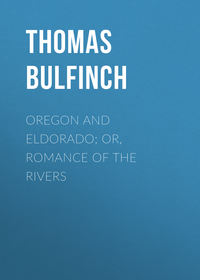 полная версия
полная версияThe Classic Myths in English Literature and in Art (2nd ed.) (1911)
For Records of German Mythology, see § 301, below; for literature and translations, see §§ 283 and 301 of the Commentary.
372
The extracts in verse are, unless otherwise stated, from the translation by W. N. Lettsom, London, 1890. Werner Hahn's Uebersetzung has also been used.
373
From Carlyle's translation of fragments of the poem.
374
For the translations of the Ring, especially the verse, I am indebted to the edition of Frederick Jameson (Schott & Co., London).
375
Myths and Myth-Makers, p. 18. Proper nouns have been anglicized.
376
Ruskin, Queen of the Air.
377
See Max Müller's Chips from a German Workshop, Science of Religion, etc.; Cox's Aryan Myths, and numerous articles by the learned authors of Roscher's Ausführliches Lexikon.
378
Max Müller, Essay on Comparative Mythology, Oxford Essays, 1856; Science of Religion, 2, 548 n.
379
Andrew Lang, Myth, Ritual, and Religion, 1, 24-25, and Professor C. P. Tiele, as cited by Lang.
380
W. E. Gladstone, Homer and the Homeric Age; Juventus Mundi; The Olympian Religion, North American Review, Feb. – May, 1892.
381
Andrew Lang, Myth, Ritual, and Religion, 2 vols., London, 1887; and Encyc. Brit., 9th ed., article, Mythology. Mannhardt, Antike Wald-und Feldkultus, Berlin, 1877. E. B. Tylor, Anthropology; Primitive Culture.
382
Encyc. Brit., Mythology.
383
Chr. A. Lobeck, Aglaophamus: On the Causes of Greek Mythology. Cited by Lang.
384
Excursion, Bk. 4.
385
Concerning which may be accepted the verdict that Mr. Ruskin passes upon Payne Knight's Symbolical Language of Ancient Art, "Not trustworthy, being little more than a mass of conjectural memoranda; but the heap is suggestive, if well sifted."
386
E. B. Tylor, Anthropology, p. 387. New York, 1881.
387
See also L. Preller, Griechische Mythologie, 1, 19. Max Müller, Comparative Mythology, Oxford Essays, 1856, pp. 1-87; also Science of Religion, 1873, pp. 335-403; Philosophy of Mythology; and Science of Language, 7th ed., 2, 421-571. Hermann Paul, Grundriss der Germanischen Philologie, Bd. 1, Lfg. 5, 982-995, Mythologie (von E. Mogk). W. Y. Sellar, Augustan Poets. Louis Dyer, Studies of the Gods in Greece. Talfourd Ely, Olympus. A. H. Petiscus, The Gods of Olympus (translated by Katherine A. Raleigh). E. Rohde, Psyche. B. I. Wheeler, Dionysos and Immortality.
388
Benfey and Cosquin. See Lang's Myth, Ritual, and Religion, 2, 299.
389
Lang, Myth, Ritual, and Religion, 2, 300; Cox, Mythology of the Aryan Nations, 1, 100.
390
The Rev. Sir G. W. Cox, Mythology of Aryan Nations, 1, 99; also, same theory, Max Müller's Chips from a German Workshop; Andrew Lang, Myth, Ritual, and Religion, 2, 297.
391
Encyc. Brit., 9th ed. Article, Mythology. Cf. Tylor's Primitive Culture, 1, 369; Tylor's Anthropology, p. 397.
392
See T. C. Johnston's Did the Phœnicians Discover America? 1892.
393
Odyssey 8, 250.
394
Cf. the experience of Sigurd.
395
Il Penseroso, II. 103-108.
396
Faerie Queene, 4, 11, 23.
397
See E. B. Clapp, Greek Morality and Religion as Set forth by Pindar (Hibbert Journal, 8, 283).
398
For other authorities and for a few standard translations of the Greek Classics, see Commentary, § 298.
399
With regard to translations of these and other Latin poets, see Commentary, § 299.
400
Based upon Lucian's Lucius or the Ass, and other Greek stories.
401
Translation in Walter Pater's Marius the Epicurean.
402
For literature, see Commentary.
403
Cleasby and Vigfusson's Icelandic-English Dictionary.
404
F. W. Horn's Geschichte d. Literatur d. Skandinavischen Nordens, 27-42.
405
Cleasby and Vigfusson's Dictionary; Lüning's Die Edda, 1859.
406
The Lay of Rig in Snorri's Edda; Vigfusson and Powell's Corpus Poeticum Boreale, 2, 514.
407
Jacob Grimm.
408
The Celtic aideadh: Professor Rhys, Academy, January 31, 1880.
409
Arne Magnússon, see Morley's English Writers, 2, 336, and Murray's New English Dictionary.
410
Corpus Poeticum Boreale, 1; xxvii, etc.
411
Corpus Poeticum Boreale, 1; lxxi; lxiii-lxiv.
412
For literature, see Commentary.
413
Paul's Grundriss d. Germanischen Philologie: Bd. 1, Lfg. 5, Mythologie.
414
Morris and Magnusson's The Story of the Volsungs and Nibelungs. Horn's Geschichte d. Literatur d. Skandinavischen Nordens, 27-42, 58, etc.
415
Werner Hahn, Das Nibelungenlied.
416
The Grimm Brothers; v. d. Hagen; Vilmar.
417
Werner Hahn; Jas. Sime, Encyc. Brit. Nibelungenlied.
418
Pfeiffer.
419
Bartsch, see Encyc. Brit.
420
Werner Hahn, 18, 58-60.
421
For translations of Oriental Myths, see Commentary. For mythical personages, see Index and Dictionary.
422
For assistance in collecting references to English poetry the author is indebted to Miss M. B. Clayes, a graduate of the University of California.
423
Popular etymology. The suffix īon is patronymic.
424
Popular etymology. The root of the name indicates Fire-god.
425
For Latin names, see Index or Chapters II-V.
426
The Olympian Religion (No. Am. Rev. May, 1892). See his Juventus Mundi.
427
Furtwängler (Meisterw. d. gr. Plastik) condemns the ægis.
428
This dawn theory is certainly far-fetched.


